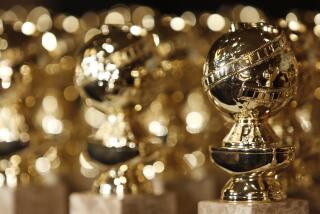COULD THIS MAN SAVE THE OSCARS?
OSCAR organizers are not, of course, required to reserve a role at the telecast for Sacha Baron Cohen. After all, there’s always the chance that he may turn up in character as the bumbling, impossibly swarthy Kazakh reporter Borat Sagdiyev and unsettle the tuxedoed attendees by offering one of his heavily accented and characteristically inappropriate greetings, such as “Good evening, gentlemen and prostitutes!” But consider: The 35-year-old British actor, creator of the wildly popular Borat as well as the preternaturally misinformed hip-hopper Ali G, may offer ABC and the Academy of Motion Picture Arts & Sciences one of their best chances in years to score with young viewers, who’ve proven hard to reach despite back-to-back Oscar hosts with large fan bases and impeccable pop-culture credibility, Chris Rock and Jon Stewart.
Baron Cohen -- among the nominees for best adapted screenplay for the hit comedy “Borat: Cultural Learnings of America for Make Benefit Glorious Nation of Kazakhstan” -- could prove a powerful antidote to award apathy. His ribald acceptance speech at the Golden Globes on NBC for his lead role was perhaps the only buzz-worthy moment in a night otherwise deemed fairly dull. And though he may not have been single-handedly responsible, ratings climbed too: The telecast delivered a total of 20 million viewers, up 6% compared with the previous year, according to Nielsen Media Research.
What’s more, industry observers point out that Oscar needs all the heat it can get this year, because the best picture nominees -- including such modest performers as “Babel,” “Letters From Iwo Jima” and “The Queen” -- haven’t exactly set the box office afire. Despite the directing pedigree of Clint Eastwood, “Letters” had made less than $3 million in U.S. box office when the nominations were announced last week (granted it was still in limited release). “Borat,” by comparison, is a blockbuster, earning more than $127 million to date.
“They should be flying him in on the academy jet,” cracked veteran publicist Howard Bragman of the PR firm Fifteen Minutes, who says Cohen is the kind of celebrity who could bring in viewers who won’t bother to see any of the most-nominated films.
“The films are not resonating,” Bragman added. “There’s a big disconnect between what people go see and what the Oscars honor. So they would do well to have him come out at the Oscars and do some shtick.”
For its part, the academy is saying nothing about what plans it might have for Baron Cohen, as a presenter or otherwise. Through a spokeswoman, telecast producer Laura Ziskin and other officials declined to comment. Baron Cohen’s publicist said the actor was unavailable for this article.
But there’s no question that the Oscars need some help in regaining their grip on young people. While the overall audience for the telecast has remained fairly steady in recent years, at about 40 million viewers, the share of young adults watching the program has been declining over the last decade. The telecasts hosted by Rock and Stewart posted even lower shares of the key demographic of adults age 18 to 49 than did the 2004 show with Billy Crystal, according to figures from Nielsen Media Research.
In a TV landscape cluttered with award shows, some experts say, the Oscars are seen as staid and establishmentarian. Although this year’s host, Ellen DeGeneres, is widely praised for her broad appeal and unflappability, she’s hardly a daring choice, given that her talk show runs every weekday on syndicated television.
“Younger viewers live their lives pushing the envelope, breaking rules and bending rules,” said Shari Anne Brill of the New York-based ad firm Carat USA. “As long as the Oscars are perceived to have a certain rigidity, they’re not going to be relatable to young people.” Added Bragman: “The problem with the shows is that they lack any kind of spontaneity or buzz factor.”
What made Baron Cohen’s Globes speech so remarkable was that he cleverly managed to stay outrageous and unpredictable without uttering curse words that would need to be bleeped or might arouse the ire of TV activist groups. Baron Cohen treated viewers to a graphic reminiscence of the film’s most notorious scene, a naked wrestling match between himself and rotund costar Ken Davitian. The Globes clip became popular on YouTube and other video-sharing websites.
Naturally, there’s no guarantee that Baron Cohen would prove a hit at the Oscars. His wide exposure seems likely to generate a backlash soon among the very cognoscenti who embraced “Borat” in the first place. What’s more, his humor can still alienate. As well-received as his Globe speech was, he drew quite a different response at last year’s MTV Movie Awards, where, in character as Borat, he proceeded to make crude remarks about Jessica Simpson’s anatomy. Some audience members booed and the off-color material was zapped for rebroadcasts.
Maybe most important, academy members haven’t always proved willing to poke fun at themselves, tending toward the self-serious on their big night.
When Rock took a swipe at Jude Law and other young actors in his edgy 2005 monologue, an unamused Sean Penn later interrupted his presentation of the best actress Oscar to praise Law as “one of our finest actors.” But such formality may prove untenable if Oscar continues to fight for relevance among young viewers. In coming years, Brill suggested, “They might try Borat hosting.”
More to Read
Only good movies
Get the Indie Focus newsletter, Mark Olsen's weekly guide to the world of cinema.
You may occasionally receive promotional content from the Los Angeles Times.











